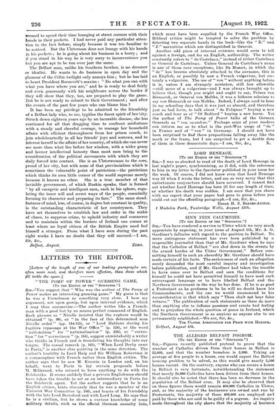LETTERS TO THE EDITOR.
[Letters of the length of one of our leading paragraphs are often more read, and therefore more effective, than those which fill treble the space.]
" THE POMP OF POWER " GUESSING GAME. [To THE EDITOR OF THE " SPECTATOR."] Sta,—*-You suggest that " Who was the author of The Pomp of Power makes an interesting guessing game." My guess is that he was a Frenchman or something very close. I base my argument, not upon gossip, but upon internal evidence, which I may thus summarize :—The author writes like a French- man with a good but by no means perfect command of English. Such phrases as "Nivelle insisted that the rupture would be obtained " (p. 99), or " in the face of this determined man Nivelle ceded " (pp. 114-115), or " Lord Haldane during his fugitive repassage at the War Office" (p. 124), or the word " nationalism " for " nationalization " (p. 224), or " correc- tion " for " correctness " (p. 185), suggest unmistakably a writer who thinks in French and is translating his thoughts into our tongue. The casual remark (p. 165), " When Lord Derby came to Paris," is another clue pointing in the same direction. The author's hostility to Lord Haig and Sir William Robertson is a commonplace with French rather than English critics. The author says that he saw M. Krassin in London and, on his behalf, went to Paris to lay certain proposals before M. Millerand, who refused to have anything to do with the Bolsheviks. It seems unlikely that a private Englishman should have taken the trouble to act as an intermediary in Paris for the Bolshevik agent. Yet the author suggests that he is an English citizen, hints obscurely that he was a member of the Unionist War Committee (p. 148), and boasts of his friendship with the late Lord Beresford and with Lord Long. He says that he is a civilian, but he shows a curious knowledge of some military details, such as the official German casualty lists,
which must have been supplied by the French Wag. Office. Biblical critics might be tempted to solve the problem by detecting two separate hands in the book—like the "E." and " J." narratives which are distinguished in Genesis.
Another odd piece of internal evidence would seem to tell against a foreign, and for an English, authorship. The writer constantly refers to " de Castelnau," instead of either Castelnau or General de Castelnau. Unless General de Castelnau's name is one of those rare exceptions, like De Musset, in which the " de " has become absolutely attached to the surname, this is an English, or possibly by now a French vulgarism, but cer- tainly a vulgarism. The use of " von " without anything before it is, unless I am strangely mistaken, still less allowable —still more of a vulgarism—and I was always brought up to believe that, though you might and ought to say, Prince von Bismarck, or General von Moltke, it was a hideous solecism to say von Bismarck or von Moltke. Indeed, I always used to hear in my schoolboy days that it was just as absurd, and therefore just as bad form, to talk about "de Polignac" buying a new coach and four as of " Of Bedford " buying a new horse. Yet the author of The Pomp of Power talks of the German Generals as " von so-and-so." Perhaps some of your readers can inform me as to what is the post-War usage of "de " in France and of " von " in Germany. I should not have been surprised to find these prepositions falling away like the mark or the franc, but I am surprised to get a double dose of them in these democratic days.—I am, Sir, &c., X.


































 Previous page
Previous page